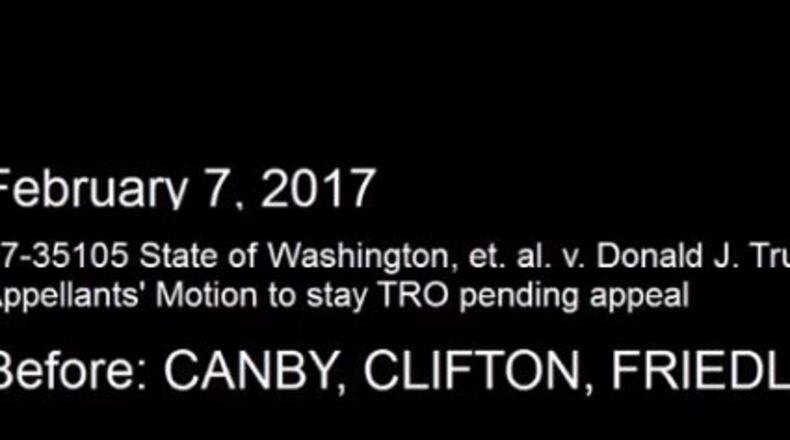A three judge federal appeals panel pressed lawyers for both the U.S. Justice Department and the State of Washington on Tuesday, as the judges tried to determine whether to leave President Donald Trump's travel ban on hold, or lift a temporary restraining order against it that was put in place by a federal district judge in Seattle last Friday night.
The hour of arguments left pock marks on both sides, as lawyers for the government and the states seemed to struggle with some of the details of the case, which was broadcast live on the internet.
"I'm not sure I'm convincing the court here," Justice Department lawyer August Flentje said at one point.
Flentje was on the defensive for much of his argument time, as he tried to make the case that the President has been granted the authority by Congress to deny entry to certain foreign travelers on national security grounds.
"Congress has expressly authorized the President to suspend entry of classes of aliens when it is necessary or otherwise when it would be detrimental to the interests of the United States," Flentje said.
At one point, the judges asked Flentje if he was arguing that the President's order was not even reviewable.
Flentje paused for almost five seconds of silence, and then answered, "Yes."
The lawyer for the states of Washington and Minnesota disagreed on that point, arguing that the states certainly have the standing to force a court review of Mr. Trump's plan, which pauses refugee admissions for 90 days and puts a halt to any arrivals from seven different majority-Muslim nations.
"The court can review this order, the court should review this order, and should give it the constitutional and statutory scrutiny that it deserves," said Washington State Solicitor General Noah Purcell.
Purcell got off to a much smoother start in his arguments than Flentje, but then started to struggle later on, as the judges zeroed in for more detail.
This issue of whether the Trump order was a "Muslim ban" or not was brought up by Judge Richard Clifton, who was put on the Ninth Circuit by President George W. Bush.
"Could the President simply say in the order, we're not going to let any Muslims in?"
"That's not what the order does here," said the DOJ's Flentje.
Judge Clifton said the seven countries singled out by the order don't cover all Muslims in the world, making the case that the order is not discriminatory against a religion.
The Washington State solicitor though raised outside statements by President Trump, talking about a Muslim ban.
"The public statements from the President and his top advisors reflecting that intent are strong evidence," Purcell said.
The Ninth Circuit told reporters that a decision was "not expected to come down today, but probably this week."
You can listen to the full argument here.
About the Author
The Latest
Featured



